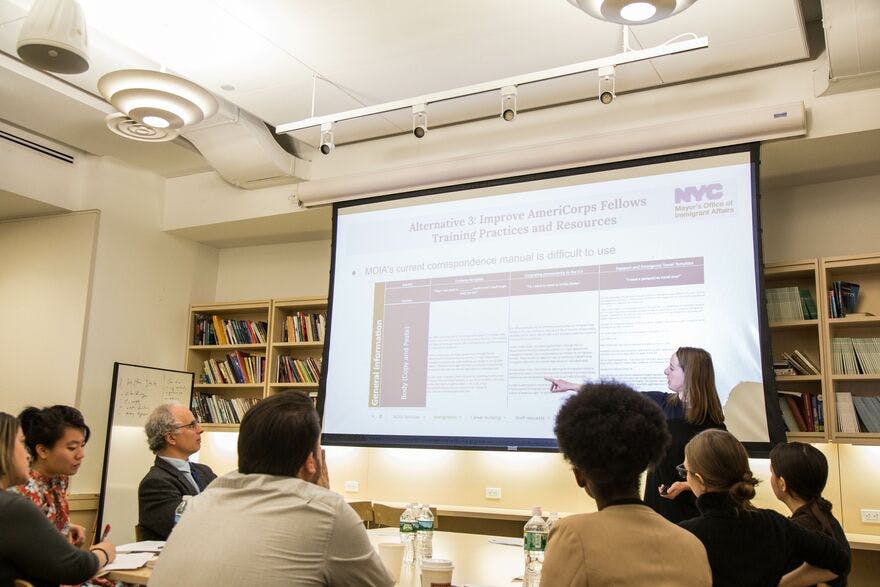
In a city with more than three million immigrants, few governmental agencies have greater impact than the New York Mayor’s Office of Immigrant Affairs (MOIA). Due to major revisions to federal immigration policies in the last few years — including changes to DACA and the Dream Act, and implementation of controversial travel bans — MOIA has been flooded with inquiries from vulnerable people trying to navigate an opaque and erratic system.
Seeking outside input, MOIA recently turned to an unconventional resource: a group of graduate students from the Public and Urban Policy MS program taking part in the Urban Policy Lab — the New School's oldest and largest client-centered course. Despite the immense scope and gravity of MOIA’s challenge, the students were able to coherently frame the issue, research and interview key stakeholders, and present the client with a formal recommendation. The exercise and lab hold to the New School tradition of taking education outside the classroom and engaging with the local community.
In this case, the students' larger goal was to identify how MOIA can improve its workflow and better serve the city’s growing immigrant population. Having studied how the agency fields phone calls and responds to digital inquiries, the students proposed alternatives that would optimize communications at minimal financial cost. They then held a formal briefing that was attended by two city officials and included a discussion to inform a final written report for MOIA.
“The Lab simulates the kinds of situations that students will face as professionals in government and the nonprofit sector,” says Alex Schwartz, a professor of public and urban policy at The New School and director of the Urban Policy Lab. “Seeing a senior government official or nonprofit executive treat the students as staff — asking them tough questions, listening carefully to their responses, engaging in intense dialog — never ceases to move me.”
While many urban policy programs include a capstone project,
Milano’s Urban Policy Lab is unique because most students take during their
first year of study in the program. Indeed, one of the Lab’s goals is to
prepare students for their subsequent thesis project, when they serve as a
consultant for a client of their choosing, helping them address a pressing
policy or management issue.
Building on
their Lab experience, students in their final year serve as a consultant for a
client of their choosing, helping them address a pressing policy or management
issue. Many of the students who take part in the Lab have never
conducted research at such a high level or worked directly with clients in the
policy sector, which means they have to learn quickly and pick up new skills,
like public speaking and project management. “I think a lot of people — myself
included — learn best when we are doing the work in real time, for real
issues,” says Lila Zwonitzer, a student who consulted for MOIA. “The lab
engages with the city and its agencies, which is the best way I can imagine
getting experience in policy and its New York City-specific nuances.”
Even though students only have a few weeks to become experts and advise on an issue, the results of the Urban Policy Lab are consistently effective. “We’ve been super pleased and impressed by the level of work and input,” says Aileen Reyes Arias, Director of Intergovernmental Affairs at MOIA, who attended the formal briefing. “We are absolutely going to raise all of these findings to the extent possible and try to make them happen,” added her colleague, Sabrina Fong, also in attendance.
From helping MOIA optimize its communication channels, to improving bike infrastructure in central Brooklyn, and
expanding affordable housing opportunities for
transgender New Yorkers; students at the Urban Policy Lab are engaged with the city on all fronts. This experience informs their careers and work beyond The New School as well. “Alumni often rate the Urban Policy Lab among the most valuable courses they took in the program,” says Schwartz. The lab teaches students to be agile and fearless when taking on issues about which they previously had little knowledge — a skill that is essential to work in an increasingly dynamic and unpredictable world.